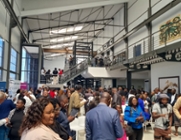Planning public spaces for successful local economies

21 November 2018
The second day of the Africities Conference in Marrakech got off to an auspicious start with an important session entitled 'Local strategies for making pubilc land and space to foster equitable economic growth in cities', organised by Cities Alliance.
Local land, resources and assets
Local Economic Development Adviser, Ms Phumla Ndaba, from CLGF's Southern Africa regional office addressed the audience, advising that they should "start with what you have - what land, resources or assets do you have which can be used for economic development." She emphasised that the planning of public spaces must be integrated with the economy, people and environment. "Participatory planning is essential, with a real focus on planning with people, especially women."
Safety for women
Local economies are stronger and benefit in general when women are able to play a meaningful part. Safety in public places, however, is a major consideration and when this cannot be guaranteed, is a major barrier for women. With more women of all ages involved in the planning processes, particularly at local government level, more thought can be given to ensuring public spaces are as safe as possible. Empowering women to participate in public life, especially at local government level, is a key priority for CLGF and more information about the Commonwealth Women in Local Government Network (ComWLG) can be found on the website.
The aim of the session was to share new research and insights on this theme; provide a venue for multi-stakeholder discussions; and highlight the significance of improved access to public goods and services for more equitable economic growth in African cities
Allowing economies to grow and people to thrive
Public land and space are key assets in the transition towards more sustainable, inclusive and equitable city economies in Africa. The public goods, amenities and services located on public land are part of the urban infrastructure that allows economies to grow and people to thrive. Inclusive public spaces such as streets, pavements and markets are fundamental to the productivity and wellbeing of workers and formal and informal businesses, as primary sites of economic, social and cultural exchange. Regulated access to public space is a direct productive asset to the urban workforce, particularly the working poor in the informal economy. Most importantly, well managed and maintained public land and spaces can increase land and property value and generate much needed revenues though taxes and fees.
Find out more about the discussions at Africities from the summary of recommendations
Back to News





